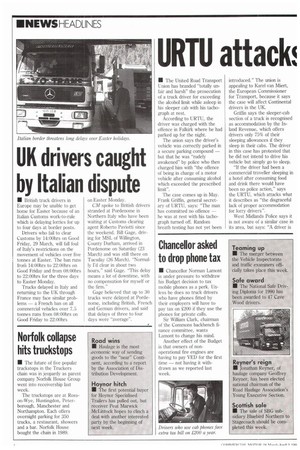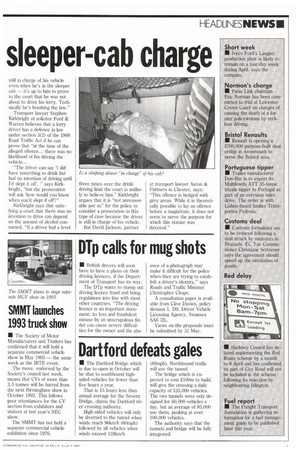URTU attack! sleeper-cab charge
Page 6

Page 7

If you've noticed an error in this article please click here to report it so we can fix it.
/ The United Road Transport Union has branded "totally unfair and harsh" the prosecution of a truck driver for exceeding the alcohol limit while asleep in his sleeper cab with his tachograph at rest.
According to uRTu, the driver was charged with the offence in Falkirk where he had parked up for the night.
The union says the driver's vehicle was correctly parked in a secure parking compound — but that he was "rudely awakened" by police who then charged him with "the offence of being in charge of a motor vehicle after consuming alcohol which exceeded the prescribed limit".
The case comes up in May. Frank Griffin, general secretary of URTU, says: "The man has committed no offence — he was at rest with his tachograph turned off. Random breath testing has not yet been introduced." The union is appealing to Karel van Miert, the European Commissioner for Transport, because it says the case will affect Continental drivers in the UK.
Griffin says the sleeper-cab section of a truck is recognised as accommodation by the Inland Revenue, which offers drivers only 75% of their sleeping allowances if they sleep in their cabs. The driver in this case has protested that he did not intend to drive his vehicle but simply go to sleep.
"If the driver had been a commercial traveller sleeping in a hotel after consuming food and drink there would have been no police action," says the URTU, which attacks what it describes as "the disgraceful lack of proper accommodation for lorry drivers".
West Midlands Police says it is not aware of a similar case in its area, but says: "A driver is still in charge of his vehicle even when he's in the sleeper cab — it's up to him to prove to the court that he was not about to drive his lorry. Technically he's breaking the law."
Transport lawyer Stephen Kirkbright of solicitor Ford & Warren believes that a lorry driver has a defence in law under section 5(2) of the 1988 Road Traffic Act if he can prove that "at the time of the alleged offence... there was no likelihood of his driving the vehicle...
"The driver can say '1 did have something to drink but had no intention of driving until I'd slept it off', "says Kirkbright, "but the prosecution will ask 'how would you know when you'd slept if off?"
Kirkbright says that satisfying a court that there was no intention to drive can depend on the amount of alcohol consumed. "If a driver had a level three times over the drink/ driving limit the court is unlikely to believe him." Kirkbright argues that it is "not unreasonable per se" for the police to consider a prosecution in this type of case because the driver is still in charge of his vehicle.
But David Jackson, partner at transport lawyer Aaron & Partners in Chester, says: "This offence is hedged with grey areas. While it is theoretically possible to lay an offence before a magistrate, it does not seem to serve the purpose for which this statute was directed."
















































































